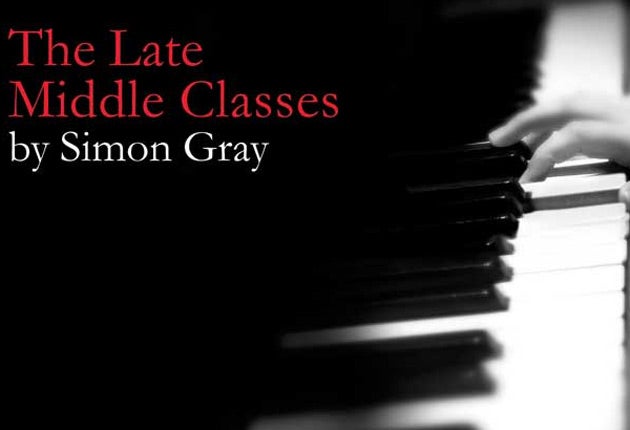The Late Middle Classes, Donmar Warehouse, London

Your support helps us to tell the story
From reproductive rights to climate change to Big Tech, The Independent is on the ground when the story is developing. Whether it's investigating the financials of Elon Musk's pro-Trump PAC or producing our latest documentary, 'The A Word', which shines a light on the American women fighting for reproductive rights, we know how important it is to parse out the facts from the messaging.
At such a critical moment in US history, we need reporters on the ground. Your donation allows us to keep sending journalists to speak to both sides of the story.
The Independent is trusted by Americans across the entire political spectrum. And unlike many other quality news outlets, we choose not to lock Americans out of our reporting and analysis with paywalls. We believe quality journalism should be available to everyone, paid for by those who can afford it.
Your support makes all the difference.The late Harold Pinter, who first directed the late Simon Gray's The Late Middle Classes, found it to be a rich and beautifully wrought piece of work that was "deeply satisfying" to direct. I see what he means but I do not share his certainty.
That production, which I saw at the Watford Palace, never made the West End. That led to some grumpy protestations, not least from Pinter. So it's good to see the Donmar reviving the piece, even if David Leveaux's production doesn't prove any more persuasive.
There is an air of innocent paedophilia surrounding young Holly's piano lessons with a German refugee, Mr Brownlow, on Hayling Island in the 1950s. The play is contained within a return visit of grown-up Holly (played by Peter Sullivan, who also plays Holly's dad, the pathologist Charles) to his expiring music teacher (Robert Glenister). There's a sort of History Boys poignancy to this relationship, which remains inexplicit though fiercely defended by Brownlow's old mum, Ellie (Eleanor Bron).
Holly's parents are mystified by their son's artistic leanings. Celia, played by Helen McCrory with a snobbish skittishness disguising vulnerability, is an ex-gym mistress wreaking revenge on her "island" race by pulverising them on the tennis court. Charles is enlivening his plods among the corpses at work with casual affairs.
These tensions, and confusions over their son, come to a head in the one magnificent scene, at the start of the second act, where old scores are settled with old sores opened and Gray bursts through the comedy clouds of Coward and Rattigan. Otherwise, the musical doodling on the Bechstein is a bit of a problem, as is the "ageing" challenge that is symptomatic of Gray's theatrical impracticality. Line by line, though, the writing is a joy, and Helen McCrory is both devilish and divine.
To 17 July (0844 871 7624)
Join our commenting forum
Join thought-provoking conversations, follow other Independent readers and see their replies
Comments